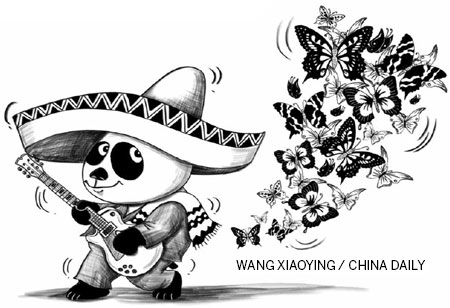A boost for South-South ties
- By Gina Caballero
 0 Comment(s)
0 Comment(s) Print
Print E-mail China Daily, May 29, 2013
E-mail China Daily, May 29, 2013

President Xi Jinping's third trip - the first time as president - to the Caribbean and Latin America, during which he will visit Trinidad and Tobago, Costa Rica and Mexico, is expected to take the multilateral relationship to greater heights.
Speaking at the UN Economic Commission for Latin America and the Caribbean in Santiago, in June 2011, Xi, then China's vice-president, had said that Beijing would continue broadening and deepening cooperation with the region to give the multilateral relationship "a fresh starting point and raise it to greater heights". Relations between China and the region have indeed gained momentum since then and new mechanisms and funds covering a wide range of areas have been proposed.
Set against increasing trade, which has made the region China's most dynamic trading partner, Xi's visit is important for at least two reasons.
First, his visit comes at a time when China and the region's countries are seeking ways to raise the quality of their overall engagement. Since most of the trade between the two sides remains inter-industrial in nature, commodities-rich countries, mainly in Latin America, have benefited from rising exports to China. The goods they export to China, however, are confined to a few low value-added products. In fact, Mexico and other Central American countries' trade deficits with China have increased rapidly.
Second, as China deepens its economic reforms, public as well as private Chinese enterprises look for investment opportunities abroad. As a result, Chinese investments in the Latin American and Caribbean region could throw up new business models and complement the trade and investment links between the two sides.
Since international transportation costs are rising, building such links makes perfect economic sense because they would help diversify exports, promote transfer of technology and improve the quality of jobs. For that, however, better policy coordination is needed among both public and private players in China and across the region. After all, joint ventures and partnerships forge closer trade and investment links and bring mutual benefit.
Yet the limited knowledge and understanding between the region's countries and China are preventing opportunities for this kind of joint endeavors to emerge. Therefore, China and the region's countries need to make efforts to better facilitate and coordinate the provisions of training and capacity building that would add quality to their dealings.
Apart from the creation of specific task forces which would oversee the models for new projects that are capable of intertwining investment, trade and industrial upgrading, a supplementary trade agenda is needed to effectively deepen cooperation between China and the region. Such an agenda would help China and the region's countries to cash in on the expertise of different players, both public and private, and improve their interactions and exchanges. By promoting synergy, it would also identify through formats such as expert meetings on specific areas that can add thrust to trade and investment projects.
For instance, the region's countries could learn from China's Village Electrification Program to generate renewable electricity for their rural areas. And given the sustained interest Chinese renewable energy companies have shown in the region's markets, it would be easy to build joint partnerships in this field.
In terms of form, such an agenda could facilitate and refine South-South triangular cooperation projects on specific issues. It could also help design organizational models for South-North-South cooperation, in which the expertise of different partners can be exchanged on the key premise of equality, shared ownership and sustainability.
Such arrangements could include traditional partners in international cooperation such as the European Union states and even the United States. Involving the US under clear terms of cooperation would not only benefit all sides, but also prove that China and the region's countries are committed to establishing a peaceful and stable region, which, in turn, would foster economic growth and prosperity for all.
In conclusion, a supplementary trade agenda would use the new impetus in the ties between China and the region to broaden their desired cooperation. Serving as the basis of more meaningful and sustainable economic engagement, the agenda would indeed take the multilateral relationship to greater heights.
The author is executive president of LatinChina Network for Development.






Go to Forum >>0 Comment(s)